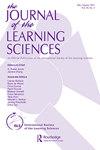Conjecture mapping to support vocationally educated adult learners in open-ended tasks
IF 3.9
1区 教育学
Q1 EDUCATION & EDUCATIONAL RESEARCH
引用次数: 8
Abstract
ABSTRACT Background This case reports on a teacher education course that aimed to support adult learners with a vocational education background to accomplish open-ended tasks. Conjecture mapping was used to identify the most salient design features, and to test if, how, and why these course features supported learners. Methods: Inspired by ethnographic approaches, sustained engagement and multiple data sources were used to explain the effects of the course design on participants’ behavior and perceptions: student and teacher interviews, observations, and artifacts. Findings: The results reveal that almost all of the proposed design features stimulated the participants toward the intended enactment processes, which in turn yielded the intended learning outcomes. For instance, worked examples (i.e., design feature) not only engendered the production of artifacts that meet high standards (i.e., enactment process) because they clarify the task requirements, but also fostered a safe structure (i.e., enactment process) by providing an overall picture of the task. Contribution: The conjecture map resulting from this study provides a theoretical frame to describe, explain, and predict how specific course design features support vocationally educated adult learners (VEAL) in open-ended tasks, and assists those who aim to implement open-ended tasks in similar contexts.猜想映射,以支持职业教育的成人学习者在开放式任务
摘要背景本案例报告了一门教师教育课程,旨在支持具有职业教育背景的成人学习者完成开放式任务。使用猜想映射来识别最显著的设计特征,并测试这些课程特征是否、如何以及为什么支持学习者。方法:受人种学方法的启发,使用持续参与和多种数据来源来解释课程设计对参与者行为和感知的影响:学生和老师的访谈,观察和工件。结果表明,几乎所有的设计特征都刺激了参与者的预期制定过程,从而产生了预期的学习成果。例如,工作实例(例如,设计特征)不仅产生了符合高标准的工件(例如,制定过程),因为它们阐明了任务需求,而且通过提供任务的总体图像,还培养了一个安全的结构(例如,制定过程)。贡献:本研究得出的猜想图提供了一个理论框架来描述、解释和预测特定课程设计特征如何支持职业教育成人学习者(VEAL)完成开放式任务,并帮助那些旨在在类似背景下实施开放式任务的人。
本文章由计算机程序翻译,如有差异,请以英文原文为准。
求助全文
约1分钟内获得全文
求助全文
来源期刊

Journal of the Learning Sciences
Multiple-
CiteScore
10.70
自引率
5.30%
发文量
17
期刊介绍:
Journal of the Learning Sciences (JLS) is one of the two official journals of the International Society of the Learning Sciences ( www.isls.org). JLS provides a multidisciplinary forum for research on education and learning that informs theories of how people learn and the design of learning environments. It publishes research that elucidates processes of learning, and the ways in which technologies, instructional practices, and learning environments can be designed to support learning in different contexts. JLS articles draw on theoretical frameworks from such diverse fields as cognitive science, sociocultural theory, educational psychology, computer science, and anthropology. Submissions are not limited to any particular research method, but must be based on rigorous analyses that present new insights into how people learn and/or how learning can be supported and enhanced. Successful submissions should position their argument within extant literature in the learning sciences. They should reflect the core practices and foci that have defined the learning sciences as a field: privileging design in methodology and pedagogy; emphasizing interdisciplinarity and methodological innovation; grounding research in real-world contexts; answering questions about learning process and mechanism, alongside outcomes; pursuing technological and pedagogical innovation; and maintaining a strong connection between research and practice.
 求助内容:
求助内容: 应助结果提醒方式:
应助结果提醒方式:


